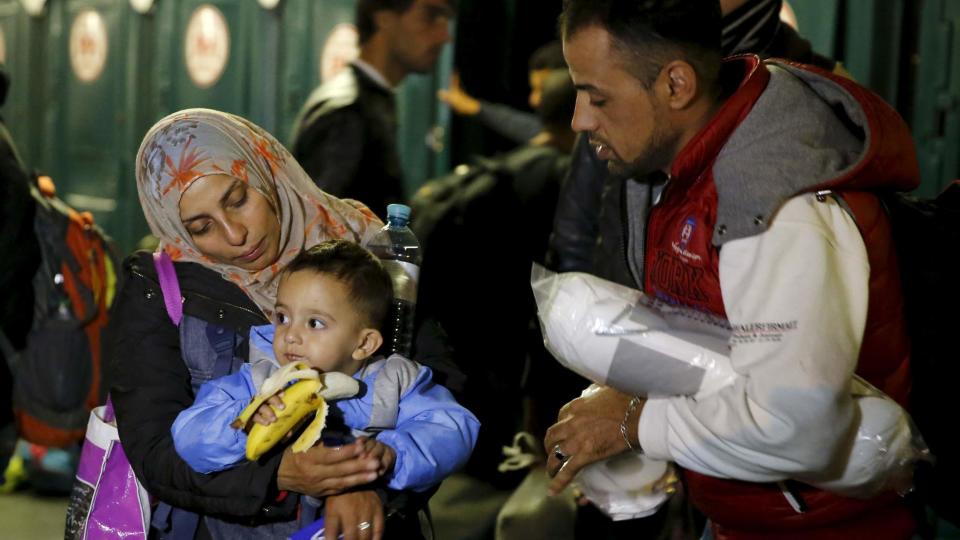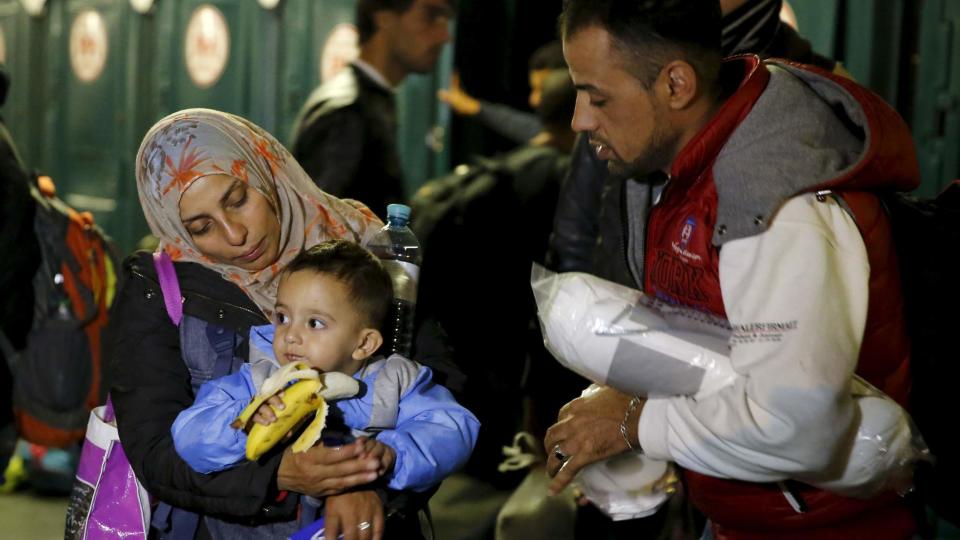Germany Tightens Border Controls Amid Influx
Germany has reintroduced border controls along its border with Austria in a move that represents a part suspension of one of the founding principles of modern Europe: free movement of people.
Controls have been brought in on road crossings - and over the weekend, Germany had stopped train traffic from Austria in an attempt to slow the influx, which saw 13,000 people arrive in the country on Saturday, followed by 3,000 on Sunday morning.
However, the train lines between Austria and Germany reopened on Monday morning - with the exception of one route to Munich. That particular line, which has been used by tens of thousands of migrants, remains closed because of trespassers.
As the debate in Europe as to how to handle the numbers of migrants making the journey to the continent continues, at least 34 people died in the Aegean Sea when their boat capsized off the island of Farmakonisi.
It is thought to be the greatest loss of life in that part of the Mediterranean this summer.
Announcing the German government's decision on border controls Interior Minister Thomas de Maiziere said: "The aim of these measures is to limit the current inflows to Germany and to return to orderly procedures when people enter the country."
He added: "This step became necessary.
"The great willingness to help that Germany has shown in recent weeks - by full-time employees and especially by the many thousands of volunteers - must not be overstrained."
Overnight at the border crossing near the Bavarian town of Passau, German border police seized 18 cars from eight different countries.
Thirty suspected people traffickers were detained and 60 migrants taken to a nearby holding centre.
Six of the vehicles were registered in Germany, five from Sweden, one from the Netherlands, one from Hungary, two from France, one from Poland, one from Austria and one from Bulgaria.
Sweden has a migration policy as generous as Germany, granting all Syrians who make it there immediate residency. It has a high immigrant Syrian and Iraqi population.
Not every vehicle is being checked. Using torches, police select vehicles with passengers. They are pulled over, the cars are searched, and the occupants' documents are checked.
The return to border controls illustrates the strain Germany is under as it continues its policy of welcoming migrants.
Germany expects 800,000 asylum seekers to reach the country this year.
City authorities in Munich have said they are "at the limit" in terms of the numbers they can house, while Economy Minister Sigmar Gabriel has warned a "lack of action" across Europe is "now pushing even Germany to the limit of its ability".
Reacting to the move, EU Commission President Jean-Claude Juncker said it showed the need to agree proposals at an emergency meeting to discuss spreading asylum seekers around the 28-nation bloc.
The main principle of the Schengen Agreement, to which 26 nations have signed up, is the abolition of internal borders and the introduction of a single external border.
There is a single border policy which all signatory countries abide by, but the agreement goes further.
It stipulates common rules on asylum - namely that those wishing to seek asylum should do so in the country where they first enter the EU/Schengen zone.
Police have the power to chase suspects across international borders within the Schengen zone.
Countries within the Schengen Zone share a common visa application process where only a single visa is required by a visitor wishing to enter any or all of the Schengen countries.
Suspending Schengen is unusual but not unprecedented, and the European Commission said Germany appeared to be legally justified in making the move.
Article 2.2 of the treaty states that signatories may reinstate border controls temporarily if it is necessary for "public policy or national security".
The commission said in a statement the aim would be to return to the normal system of no border checks between members states in Schengen "as soon as feasible".
Mr de Maiziere warned in August that the treaty was "in danger".
He explained that other countries were failing to abide by the Dublin Regulation - fulfilling their obligation to process asylum claims of all those who enter the EU through their territory.
The recent surge in people entering the EU and crossing the continent has been, in part a result of Germany's open policy towards migrants, but facilitated by other countries' willingness to allow people free passage through their territory.
Meanwhile Hungary, which has been widely criticised for the way it has treated refugees, has reacted angrily to Austrian accusations its behaviour towards tens of thousands of migrants crossing Europe was reminiscent of the actions of the Nazis.
Austrian Chancellor Werner Faymann said Hungary's claim the refugees were moving for economic reasons was irresponsible - as Vienna said it was expecting up to 8,000 new arrivals on Sunday.
Mr Faymann told German weekly Der Spiegel that Austria - along with Germany and Sweden - recognised that the migrants included those fleeing war and was standing by their right to asylum.
He was quoted as saying: "Putting refugees on trains in the belief that they are going somewhere totally different to where they think they're going reminds us of the darkest chapter of our continent's history", words taken as an allusion to the Nazi Holocaust.
But Hungarian Foreign Minister Peter Szijjarto said the comments were "totally unworthy of any leading 21st-century European politician."
He said Hungary was complying with international standards for the treatment of migrants and that Mr Faymann's "slanderous" statements were meant to "cover his own inadequacy or for domestic political gains".

 Yahoo News
Yahoo News 

